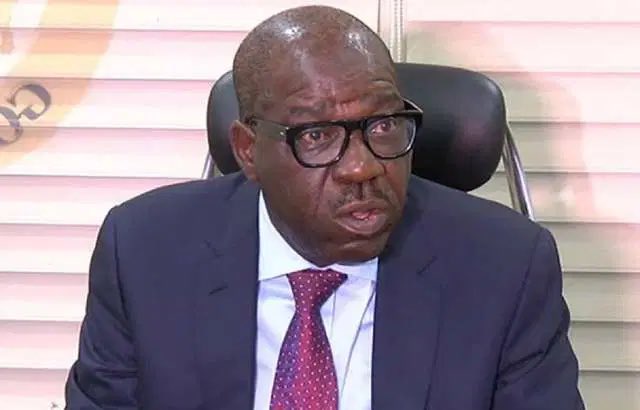The Edo State Assets Verification Committee has dropped a bombshell, revealing that the administration of former Governor Godwin Obaseki left behind a staggering contractual debt of N200 billion.
Dr Ernest Afolabi-Umakhihe, the chairman of the committee, disclosed this shocking revelation during a press briefing in Benin City on Thursday.
He accused the former administration of financial irregularities and mismanagement that have crippled the state’s finances.
“Mobilisation payments made to contractors were often funneled back to government officials,” Afolabi-Umakhihe alleged.
This, he said, has led to delays in completing vital infrastructure projects across the state.
“Elections, Roads, and Broken Promises”
Many of the road projects flagged in the committee’s report were hurriedly awarded in the months leading up to the September 2024 elections.
The chairman urged the current administration of Governor Monday Okpehbholo to seize the dry season as an opportunity to resume these abandoned projects.
“The state cannot deny Edo people the opportunity for good road networks, especially during this dry season,” Afolabi-Umakhihe emphasised.
He stressed the need for continuity in infrastructure development, even as the new government grapples with unpaid commitments.
“Radisson Hotel: A Symbol of Mismanagement?”
One of the most controversial projects highlighted was the Radisson Hotel development.
The project, initiated with N17.5 billion raised from the stock market, has become a thorn in Edo’s finances.
An initial N2 billion was paid for land acquisition, but just before leaving office, Obaseki’s administration reduced the state’s ownership stake to a meagre 20%.
“This must be rectified,” Afolabi-Umakhihe said firmly.
He insisted that Edo State must reclaim its rightful position as the primary investor in the project.
“Dubious Deals and Procurement Violations”
The committee’s findings pointed to widespread violations of procurement laws.
Contracts were inflated, with variations in contract sums sometimes exceeding the original values.
“Several projects were poorly documented and failed to comply with Edo State’s public procurement laws,” Afolabi-Umakhihe explained.
Such lapses, he said, have undermined the state’s financial health and raised questions about the transparency of the previous administration.
“Museum, Oil Palm, and Technology: More Red Flags”
The committee also flagged irregularities in the Edo State Oil Palm Project Office.
This office, directly supervised by the former governor, operated without transparency and hired consultants at exorbitant rates.
The Museum of West African Arts (MOWAA) project was another troubling case.
Despite Edo State contributing N3.8 billion in state funds and providing land, the state holds no equity stake in the museum.
“This is unacceptable,” Afolabi-Umakhihe said.
Technology projects also came under scrutiny, with a questionable N5 billion commitment made for a three-year cybersecurity software license for the EdoGov platform.
“Of this amount, N1.7 billion has already been paid by the previous administration,” the chairman revealed.
“Public Funds Misused, Edo People Shortchanged”
The committee’s findings have painted a grim picture of the state’s finances and governance under Obaseki.
“These are just some of the findings we have uncovered,” Afolabi-Umakhihe said.
He hinted that more revelations would come when the committee reconvenes in January 2025.
The chairman assured Edo residents that the committee remains committed to uncovering the truth and ensuring accountability.
“It is important to keep the public informed about our progress over the past three weeks,” he said.

